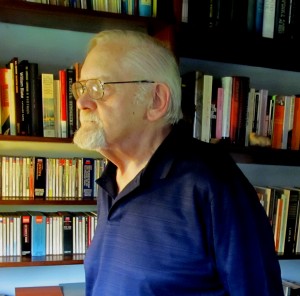
Gyroscope Review editors decided that a good way to honor contributors to our journal is with an occasional interview. Today, we bring you contributing poet James Graham.
GR: Thanks for agreeing to let us interview you for Gyroscope Review. We’re pleased that your work is included in our first issue. Will you please begin by telling us where you’re from, where you write, and why poetry?
JG: I’ve lived all my life in Ayrshire, Scotland, not far from the vibrant city of Glasgow. I write in my head, and from there to any piece of paper that’s handy. I’ve been known to pull into a layby and whip out a notebook. Then off to my den to knock it into shape on the computer. Why poetry? Simply because years ago I found I could.
GR: Who, or what, are your poetical influences?
JG: I’m not aware of ever having imitated a poet I’ve read. There are poets I love and read over and over, and I’m sure something rubs off. The most congenial of all poets for me is Walt Whitman.
GR: How do you decide what ‘form’ a poem should take?
JG: A poem takes shape as it’s written. Probably the only time I decide on form before starting is when (occasionally) I decide to write a comic or nonsense poem, and always go for rhymed verses. So many poets, classic and contemporary, can use rhyme for serious, profound work – but I can use it only for light humorous stuff!
GR: What is your writing process like?
JG: Beyond the scraps-of-paper stage, for most poems there’s a lot of revision. Often it means leaving a poem for weeks or even months, then reading it again. Sometimes I try to read it as if it were not my poem, as if I were someone who has come across it in the poetry section of a bookshop. Distance myself from it. Surprisingly often, I hit on an idea that will avoid unnecessary obscurity.
GR: Do you belong to any writer’s groups – face-to-face or online? If so, are they part of your process?
JR: There used to be a local ‘Poems and Pints’ group, which was fun but there wasn’t much feedback. Unfortunately it folded. Now I’m online every day as a ‘site expert’ (hard hat and all!) with the writers’ community Write Words (www.writewords.org.uk). WW is very much part of the process: there are some very good poets there, who say they learn from me, but I have learned a good deal from them too.
GR: What do you look for in the poetry you like to read? Any favorite poets?
JG: Technical excellence, exciting language, memorable lines – all those things; but also social conscience. No navel-gazing. A sense that the poet is reaching out to the world and offering insights into its problems and injustices. Whitman’s Civil War poems are profound examples of this. The WW1 poets, of course – not forgetting Rosenberg, one of the less celebrated but most compassionate. Two English poets of social conscience: Shelley and Clare. Finally, Bertolt Brecht – not every poem he ever wrote, but some of the best, in which he shows how to make a great poem that’s also a direct political statement.
GR: What is the most important role for poets today?
JR: See above – to offer insights into the plight of people who are denied the chance to live fulfilled lives. Of course not all poets work along these lines, but we need some. All poets have a mission, if we can call it that, to keep up the high standards of this verbal art in an age when language seems so often abused and trivialized. I’m thinking of the more mediocre pop song lyrics, tabloid newspapers, and more besides.
GR: Which poets have you had the opportunity to hear read? Alternatively, what is the most recent book you’ve read?
JG: Many years ago I heard Auden read his own work to an audience. His reading was rather flat, but somehow the poems came across well and I was very moved by them. The most recent book I’ve read isn’t a poetry book but a book about life in remote prehistory, which gave me ideas for a couple of poems.
GR: Any future plans for your work that you’d like to talk about?
JG: I hope soon to bring out a new ‘slim volume’, a new collection. It’s still in the early stages, but should be out before too long.
GR: What other interests do you have beyond literature?
JG: I’m active in Amnesty International, especially campaigns against denial of free speech, and torture and ill-treatment of prisoners. I love growing things,especially trees; my garden isn’t a garden so much as a tiny bit of woodland.
GR: Thank you for sharing your thoughts with us. We appreciate your time and your work, James.
Several of James Graham’s poems were published at the online poetry journal, Every Day Poets, during its run from 2008-2014 (www.everydaypoets.com).
James Graham’s poem, The Hurt Beech: September 2014, appears on page 13 of the Spring 2015 issue of Gyroscope Review. His poem, A Poem about Maria Teresa, also appears in that issue on page 27.